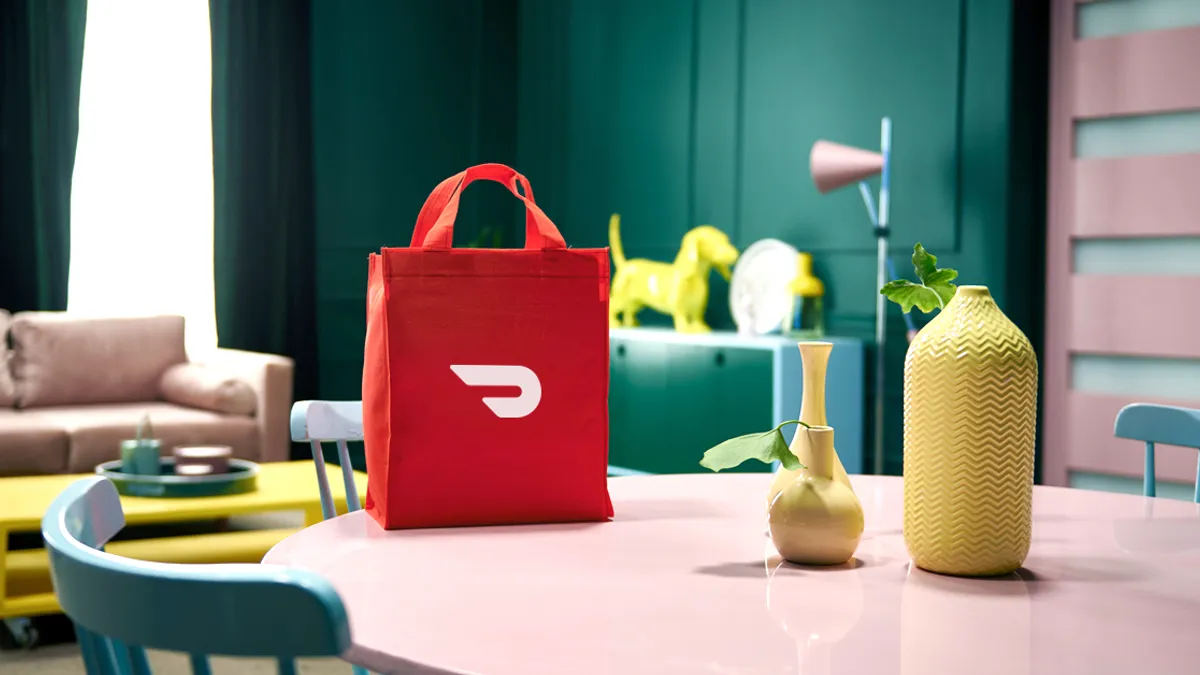Dive Brief:
- DoorDash on Monday launched a program called "Accelerator for Local Goods," which is designed to support local consumer packaged goods businesses owned by women, trans, immigrants and people of color. The program will initially support 50 local entrepreneurs from New York, Chicago or Washington, D.C., with 20 or fewer employees and less than $1 million in revenue.
- The program is part of DoorDash's Main Street Strong initiative, which was first introduced in May 2020, and includes a six-week educational course and $5,000 grants. Businesses selected for the Accelerator for Local Goods will be able to sell their products on DashMart, a DoorDash grocery and convenience store introduced in 2020 that currently includes over 400 businesses.
- The accelerator complements previous programs, such as a suite of advertising offerings launched in October, developed to support minority-owned businesses and deepen loyalty among partner businesses.
Dive Insight:
The program sharpens DoorDash's competitive edge over rival delivery platforms, and cements its status as a multi-platform aggregator — an expansion that may be key to protecting profitability in the long term.
The accelerator launch also comes when more restaurants are exploring packaged good offerings in response to growing consumer interest in cooking at home due to COVID-19 concerns. As these business sectors blend, Accelerator for Local Goods could bolster both DoorDash's established restaurant partners and the new business it is trying to capture, solidifying its market leadership position in the maturing foodservice category.
Accelerator for Local Goods provides businesses guaranteed placement on DashMart, offering them a new channel to reach potential customers and diversify their revenue streams. During DoorDash's Q4 2020 earnings call in February 2021, CEO Tony Xu called DashMart a "critical infrastructure" for merchants to expand into new geographies or increase their hours of operations.
The program's six-week educational course also covers topics such as supply chain management, wholesale vendor relationship management, managing cash flow and business development. This kind of education may be particularly necessary given the supply chain and financial pressures that still weigh on restaurants and CPG businesses due to the pandemic. Chef Stephanie Izard, who was named chief restaurant advisor at DoorDash in May 2021, helped develop the curriculum for the educational course, providing input from her own experience launching her This Little Goat line of sauces and spices.
In a statement, Tasia Hawkins, social impact program lead at DoorDash, said the program equips "aspiring entrepreneurs with the educational and financial capital to become wholesale-ready and create an even stronger relationship between local businesses and consumers residing in the community."
The accelerator could also break down financial and resource barriers for minority-owned businesses by offering merchants grants. Although minority businesses accounted for more than 50% of the new businesses started in the U.S. throughout the past 10 years, it's still challenging for these concepts to access capital. According to The Black Business Alliance, for example, just 7% of venture capital went to women-owned businesses from 2010-2015, and loan denial rates for minority-owned small businesses are three times higher than non-minority businesses. These trends don't seem to be improving much. A 2021 Black Business Owner Spotlight survey conducted by Bank of America found that 56% of Black-owned businesses cited access to capital as a barrier to their growth.













